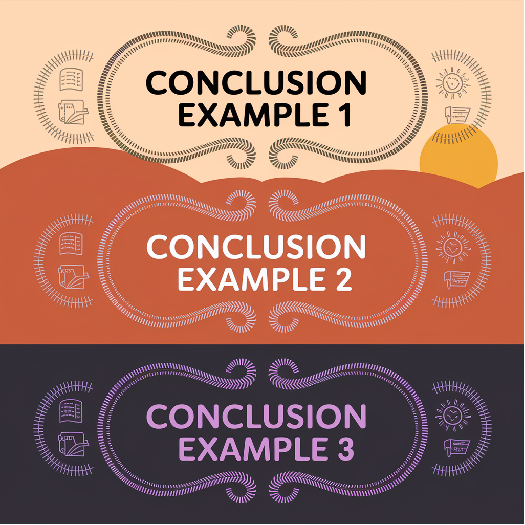A TOK essay is a critical exploration of knowledge questions that requires students to analyze the nature and limitations of knowledge. The TOK essay conclusion is a crucial part of the essay as it provides a final perspective on the topic, summarizes key arguments, and demonstrates the depth of understanding gained from the analysis. A well-written TOK conclusion not only reinforces the essay’s thesis but also leaves a lasting impression on the reader.
We will explore the key characteristics of a strong TOK essay conclusion, common mistakes to avoid, and practical tips for an insightful final section. We will also provide real examples of TOK essay conclusions with explanations of why they are effective.

Key Elements of a Strong TOK Essay Conclusion
1. Restating the Thesis with Clarity
Your conclusion should begin by succinctly restating your thesis. This reminds the reader of the central knowledge claim or question you explored throughout the essay. However, avoid simply copying your introduction; instead, reframe your thesis in light of your presented analysis.
Example:
Weak Conclusion: “In this essay, I argued that scientific knowledge is reliable because it is based on empirical evidence.”
Stronger Conclusion: “While empirical evidence strengthens the reliability of scientific knowledge, the influence of paradigms and biases highlights that certainty in science remains elusive.”
2. Summarizing Key Arguments Without Repetition
A strong TOK essay conclusion should synthesize, not just repeat, the main points made in the body paragraphs. Instead of listing them, explain how they collectively support the thesis and contribute to a nuanced understanding of the knowledge question.
Example:
Weak Conclusion: “Science is based on falsifiability, ethics influence scientific decisions, and culture affects knowledge.”
Stronger Conclusion: “The interplay between falsifiability, ethical considerations, and cultural contexts illustrates that while scientific knowledge aims for objectivity, it is inevitably shaped by human values.”
3. Addressing Alternative Perspectives
A high-scoring TOK essay acknowledges counterarguments and demonstrates an awareness of knowledge complexity. The conclusion should briefly reflect on opposing views or unresolved tensions to show a balanced perspective.
Example:
“Although historical narratives attempt to present objective accounts, the historian’s perspective, available evidence, and cultural influences inevitably shape their interpretation. Thus, the pursuit of objective history remains both necessary and paradoxical.”
4. Offering a Thought-Provoking Final Statement
A compelling conclusion leaves the reader with something to think about. Consider ending with a rhetorical question, a call for further inquiry, or a broader implication of your discussion.
Example:
“If mathematical certainty is built on axioms assumed to be true, can any knowledge ever be truly independent of human assumptions?”
Common Mistakes to Avoid
- Repeating Information Verbatim: Instead of copying sentences from earlier sections, refine your main ideas and rephrase them meaningfully.
- Introducing New Arguments or Evidence: Keep your focus on summarizing and synthesizing rather than adding new content.
- Overgeneralizing: Avoid vague statements such as “Knowledge is subjective” without context. Be specific about the scope and limitations of your argument.
- Ignoring Counterarguments: Failing to acknowledge opposing perspectives can make your argument appear one-sided.
- Lack of Closure: A weak conclusion leaves the discussion open-ended without clearly tying back to the thesis.
Example TOK Essay Conclusions (With Explanations)
Natural Sciences: The Role of Falsifiability
Conclusion: “While falsifiability serves as a key criterion distinguishing science from pseudoscience, its applicability varies across disciplines. The existence of anomalies, paradigm shifts, and ethical constraints suggests that scientific knowledge remains dynamic rather than absolute.”
Why It Works: This conclusion effectively synthesizes the key argument, acknowledges complexity, and provides a final reflection on the evolving nature of scientific knowledge.
Mathematics: The Paradox of Certainty
Conclusion: “Mathematics is often viewed as the most certain area of knowledge due to its logical structure. However, its reliance on unprovable axioms raises an important question: Does mathematical knowledge exist independently of human cognition, or is it a construct of our reasoning?”
Why It Works: This conclusion restates the thesis with nuance, acknowledges an alternative viewpoint, and ends with a thought-provoking question.
History: The Subjectivity of Historical Narratives
Conclusion: “Although historians strive for objectivity, their selection of sources, framing of events, and cultural context inevitably shape their narratives. Recognizing this subjectivity does not diminish the value of history but rather invites a more critical engagement with the past.”
Why It Works: The conclusion acknowledges both sides of the debate and reinforces the essay’s core argument while maintaining a balanced perspective.
Also, read on TOK essay knowledge questions and answers
Final Thoughts
A well-written TOK essay conclusion is the final opportunity to showcase critical thinking and depth of understanding. By restating the thesis with added insight, summarizing key arguments meaningfully, addressing counterarguments, and leaving a lasting impression, you can enhance the overall impact of your essay.
Following these guidelines ensures that your TOK essay conclusion effectively synthesizes your analysis while engaging the reader in meaningful reflection. Whether examining the nature of mathematical certainty, ethical considerations in science, or the role of subjectivity in history, your conclusion should solidify your argument and invite continued inquiry into the complexities of knowledge.









 Evan John
Evan John